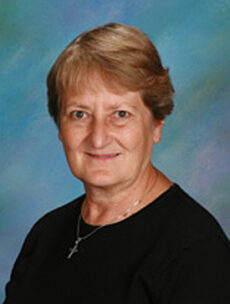Do we see what our heart longs for?

Sister Rachel Bergschneider, OSB
Living the Word / By Sister Rachel Bergschneider, OSB
Thirtieth Sunday in Ordinary Time / Oct. 24
Jeremiah 31:7-9; Psalm 126:1-2,2-3,4-5,6; Hebrews 5:1-6; Mark 10:46-52
The Gospel of Mark is genius at describing in succinct ways the healing and miracles of Jesus. His words are often few, but the impact is not to be missed. This Sunday’s Gospel follows Mark’s pattern of healing and miracles.
The passage, Mark 10:46-52, is the second of two healings centered on blindness. (The other is Mark 8:22-26.) No fuss was really made over the miracle in this episode. Faith is far more the central focus than the miracle. The miracle is simply a step on the way to the ultimate point of the story: a dialogue about faith.
The blind man gets more than he asks for. Not only is his blindness cured, but he is saved because of his faith. Ultimately, he receives the invitation to follow Jesus to Jerusalem. More important than the restoration of Bartimaeus’ physical sight is his spiritual insight into the person of Jesus. That journey will turn out to give Bartimaeus an understanding of the way of Jesus — which is the way of the cross.
We all have stories in our life about “what ifs.” We can conjure memories of events in our lives where a second chance would possibly have made life different. Suppose you had a second chance, another opportunity to live your life. What would you change? In terms of the Gospel message, what would you do differently?
WHAT DO WE OVERLOOK?
If you had the chance to have Bartimaeus’ cry come true, “Lord, I want to see!” and really mean it, what would you want to see? I suggest three possibilities.
First, we might want to see what our hearts have always told us: the most important thing in life is relationships. We spend so many hours and days side-stepping that most important reality with careers, accumulation, entertainment. We miss times and events that truly bring meaning to our lives.
There is a story about the Bolshevik revolution when thousands of bewildered suspects were randomly arrested, stripped naked and shot one by one in the back of the head. One eyewitness account captures the depth as well as the poignancy of our need to be linked, joined with others. “Most of the victims usually requested a chance to say goodbye; and because there was no one else, they embraced and kissed their executioners.” Relationships are the glue that hold life together.
A second desire we might have is to see what we so often overlook. The blindness of overlooking has become a cancer in our society. We overlook the needy, the poor, the troubled, the non-persons who suffer because they don’t count in anyone’s eyes. How many times do we overlook or look beyond the cry for attention from those who need our help, whether it be resources or care? We don’t need examples to remember in almost every given day how we have overlooked a person in need.
SEEING WHAT MATTERS
The most important cry we have is to see beyond our spiritual blindness. “I want to see” is the cry of any person serious about the spiritual life — serious about being a disciple, about following Jesus even in the difficult and unwanted places we must go.
Being cured of our spiritual blindness opens us to seeing more readily the signs of God’s love for us. It opens us to a trust that no matter the road we walk with Jesus we have the assurance that the fullness of life awaits us.
Bartimaeus was granted his request to see not only those around him, but he was able to see what his heart truly longed for — the gift of walking with Jesus to Jerusalem.
—
Sister Rachel Bergschneider, OSB, is a member of the Sisters of St. Benedict of St. Mary Monastery, Rock Island. She ministers at the Peoria County Jail, serving as a facilitator in the Jobs Partnership program.





